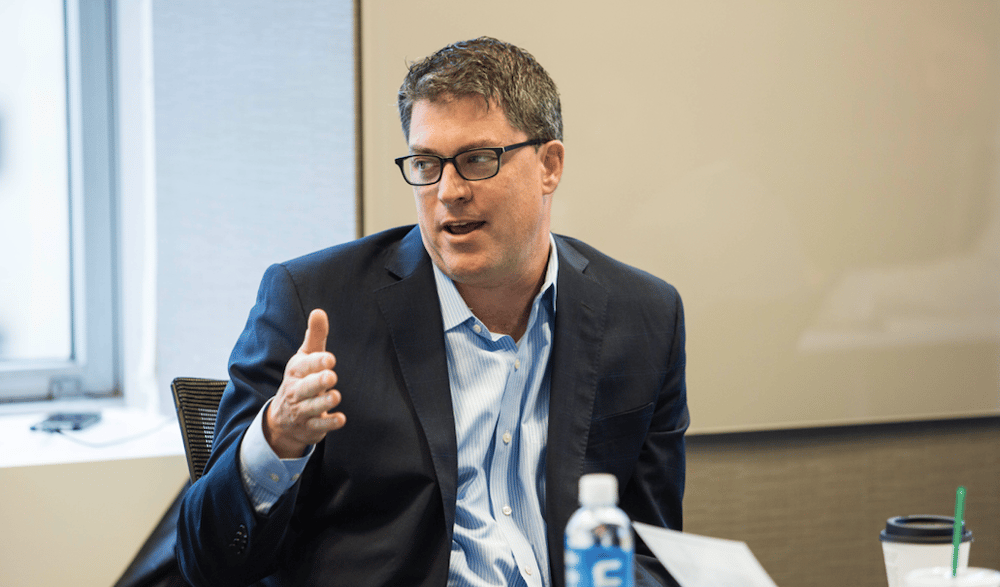What does the future of financial advice look like? For many industry leaders, it's making financial planning and investment management as easy as shopping on Amazon, ordering a ride on Uber or streaming a movie on Netflix.
But getting there requires a Herculean effort by many firms, and most have just gotten started. At a recent
InvestmentNews Future of Financial Advice roundtable in New York City, executives from more than a dozen of the industry's most tech-forward firms shared their efforts toward building the future of advice.
A common theme was the shifting of strategy away from building or buying individual technology solutions, in favor of creating a comprehensive technology platform, or ecosystem, that brings multiple functions together.
Beyond technology, this shift requires firms to change how they think about working with clients, said Eric Lordi,
Morgan Stanley Wealth Management managing director and head of product development.
The financial services industry has traditionally kept each type of client account distinct from each other and built individual technology products to manage them. Going forward, firms must think about connecting banking, insurance, retirement, brokerage and everything else in a single experience, Mr. Lordi said.
"If I had to start from scratch, I certainly wouldn't be building four products. You would build one container that does portfolio construction across accounts," Mr. Lordi said. "It wouldn't be about discretionary verses nondiscretionary; it would be about my advice and how we're going to implement it."
As it stands, the siloed nature of the industry means both advisers and clients still have to jump between several applications. There's a tool for financial planning, another tool for working with the custodian, and the adviser's own website or client portal.
This disconnection won't fly in an era when consumer technology is making everything else in life easy.
(More: Advice industry leaders focused on improving the digital client experience)
"Client expectations have changed. Financial advisers' expectations have changed," Mr. Lordi said. "They totally understand we can connect these things, and they keep asking us, why haven't we?"
Todd Thomson,
Dynasty Financial Partners' co-founder and chairman, said this is one reason why technology startups like
Betterment,
Wealthfront and
Personal Capital have built such successful client experiences: They were able to build from the ground up rather than try to stitch together a mix of legacy platforms and new technology.
Building that comprehensive, next-generation platform is doubly challenging for independent advisers who work with even more technology providers, Mr. Thompson said. Doug Besso, chief technology officer of
HighTower, agreed.
If you look at 100 independent advisers, you will often find they have 100 different technology platforms, Mr. Besso said.
Some of that complexity is out of necessity. For example, independent advisers sometimes need multiple accounting tools because clients require them to work with multiple custodians. In other cases, it's a result of business owners having strong opinions about the tools they use.
How can firms build a technology platform that accounts for all these preferences while still offering a unified experience for advisers and clients?
"As good as we all like to think we are, we're not technology firms," Mr. Thompson said. "As a result, it's not as good as it needs to be and should be."
(More: Financial firms need to standardize data so fintechs can build next-generation software)
SS&C Technologies' Black Diamond strategist Kyle Van Pelt said firms need to rethink what it means to build technology integrations.
For example, at its core Uber is a platform for connecting riders and drivers, he said. Navigation, communication, payments and every other part of the digital experience is outsourced.
"When the driver picks you up, and you try and find out where you're going to, it doesn't take you out of Uber and into Google Maps. Google Maps is just there, and Uber built on top of that," Mr. Van Pelt said. "That is integration."
Jess Liberi,
eMoney Advisor head of product, said advice firms and technology vendors need to think more about process and workflow; instead of just thinking about how one piece of software shares information with another piece, the focus should be on how advisers and clients actually use those tools in the end.
"Admittedly, I don't think we've cracked the code on this either, but it is part of what, as a team, we continuously are looking at," Ms. Liberi said. "Stop looking at things in a silo."







